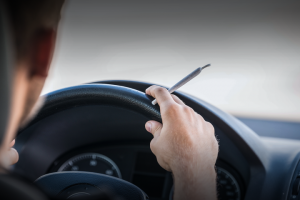Drive High? That's Impaired Driving
As of October 17th, cannabis in Canada will be legal, but it remains illegal to drive while high.
Talk of impaired driving usually focuses on people who have been drinking, however with the legalization of cannabis for recreational use on the horizon, the dialogue has broadened to include drug-impaired driving too. It’s a dialogue that likely should have started years ago as drug-impaired driving violations are on the rise in Canada.
Impaired driving in Canada
According to Statistics Canada’s annual police-reported crime numbers, overall, impaired driving in Canada has dropped for each of the last six years. In 2017, there were about 69,000 impaired driving incidents across the country, a decrease of four per cent from the year before. This number includes both alcohol and drug-impaired driving violations.
This downward trend, however, is largely a result of fewer alcohol-impaired driving violations, which make up 95 per cent of all impaired driving incidents. Drug-impaired driving, on the other hand, is on the rise. Last year, there were 3,489 drug-impaired driving incidents, a 10 per cent increase from the year before. In 2016, there were 3,098, and the year before that 2,786.
Whether high or drunk, impaired is impaired
Whether it’s by alcohol, cannabis or any other drug (prescription or otherwise), driving impaired is illegal. If caught, the penalties are severe and can include licence suspension, fines, vehicle impoundment, criminal charges and jail time. And when it comes to your auto insurance, an impaired driving conviction will affect you financially for years with premiums that are considerably more expensive.
One in seven cannabis users have driven while under the influence

The National Cannabis Survey is a Statistics Canada initiative to track the impact of legalization of non-medical cannabis. So far, the results suggest that of the survey respondents who are cannabis users with a driver’s licence, one in seven have driven within two hours of using the drug.
It’s widely acknowledged, however, that impairment lasts longer than two hours and these drivers, if they continue this behavior, risk being charged with impaired driving. The risk may be even greater now that the federal government has approved a roadside drug screening device that can detect the presence of THC in a person’s saliva. THC is the main impairing component in cannabis. Previously, police had only the Standardized Field Sobriety Test and Drug Recognition Expert Evaluation to rely on.
New drug-impaired driving laws in Canada
Drug-impaired driving has been on the books as being illegal since 1925. It’s not a new law. However, new federal laws have been implemented that outline the levels of THC that are unacceptable for driving and are illegal. These laws came into force on June 21, 2018 and the following is a rundown of the types of fines you’ll face for a first-time offence:
- A fine of up to $1,000 if you’re caught driving with 2 nanograms (ng) of THC per millilitre (ml) of blood but less than 5 ng.
- A mandatory minimum fine of $1,000 if you have more than 5 ng of THC in your system.
- A mandatory minimum fine of $1,000 if you have 50 milligrams of alcohol per 100 ml of blood along with 2.5 ng of THC in your system.
Along with these fines, a person convicted of impaired driving will also likely lose their licence for a year. For repeat offenders, or drivers who cause bodily harm or death while behind the wheel and drug-impaired, the penalties increase and are far more punishing.
Provincially the impaired driving laws are changing too
In addition to the federal rules, each province has their own set of cannabis-specific driving laws.
In Ontario, for example, a zero-tolerance approach for young drivers (under 21), drivers who hold their G1 or G2 (regardless of age) and commercial drivers has been adopted. These laws came into force in July and include an immediate roadside driver’s licence suspension. Alberta has taken a similar stance. Drivers who are still navigating the province’s graduated licensing program will face an immediate 30-day licence suspension and 7-day vehicle seizure if any amount of cannabis or illegal drugs are found in their system.
Take the high road and don’t drive impaired
As one of only a handful of countries in the world to allow recreational cannabis use, Canada is about to embark on a road trip few have taken.
Travel safely and don’t drive impaired.
Find the Plan to Cover Your Car
For over 30 years Acumen Insurance has been a leader in providing personal home and car insurance products. We have always excelled in providing our clients with the best options to suit their needs and lifestyle. Let us help you choose the right home and car insurance policy for you. Call and speak to one of our brokers directly 905-574-7000 or get a quote online now.